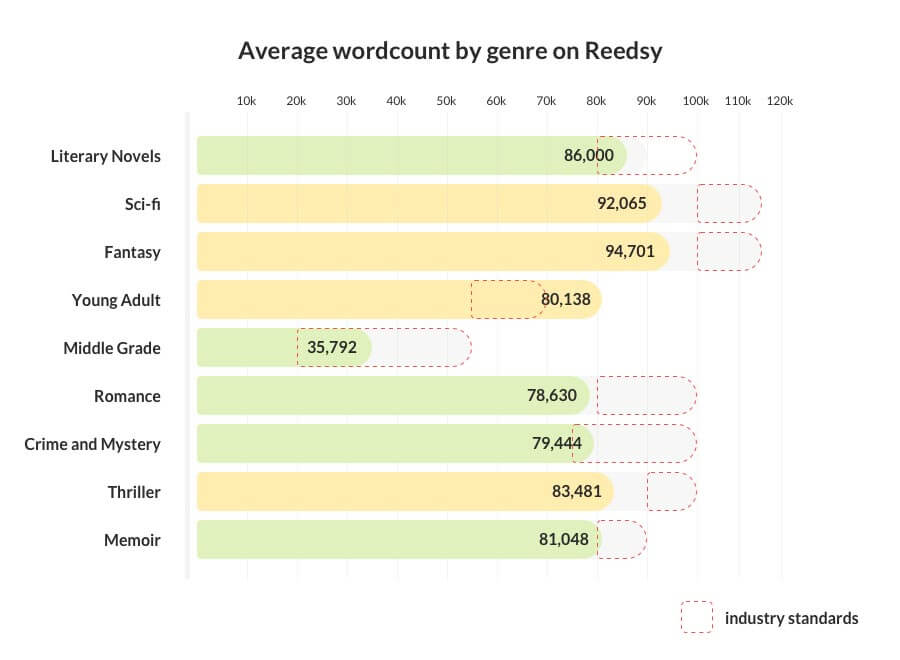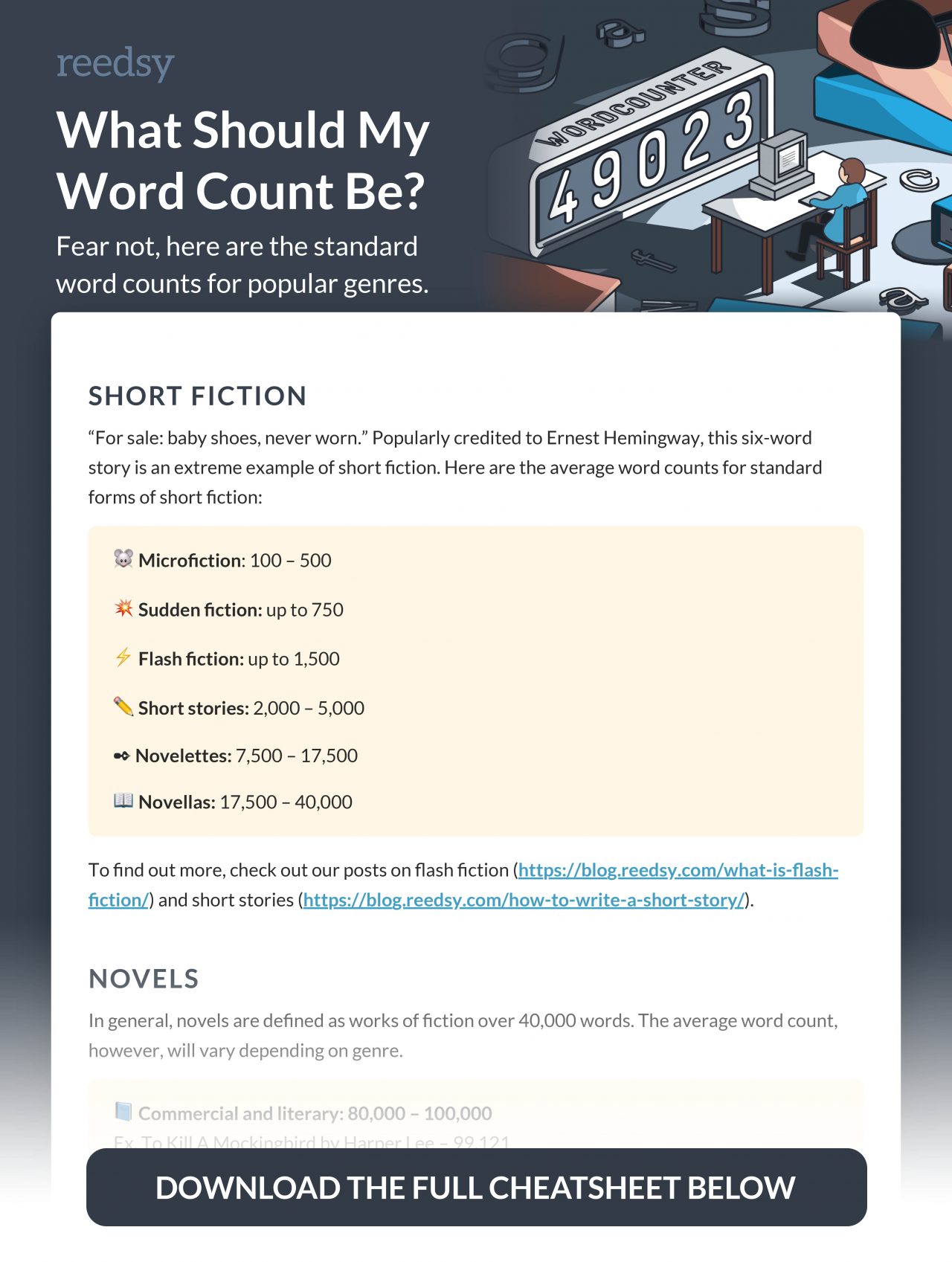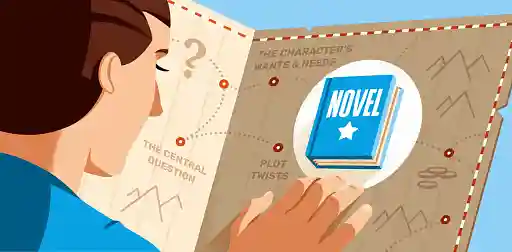Blog • Perfecting your Craft, Understanding Publishing
Last updated on Feb 07, 2023
How Many Words in a Novel? (Updated for 2024)
Many authors are gearing up to weave worlds, characters, and stories into novels with their words. But… how many words does a novel make? And when it comes to creating art, just how important is it to stick to the rules — such as standard word counts?
Well, if your goal is to publish and sell your novel, those rules are pretty darn important. As with many publishing standards, word count guidelines exist for a number of reasons — including marketing and sales — but also to help create stories that are free from pacing issues that can exhaust readers. You wouldn’t be reading this article right now if a quick scroll down showed an apparent 10,000 words, would you?
Why does word count matter?
“Word count limits sometimes seem as though they are stifling artistic flow, but they are usually there for a reason,” says Freelance Editor Lisa Howard.
If you’re hoping to land a book deal with a traditional publisher, you don’t want to give an editor a reason to turn your book away. That’s why Freelance Editor Jessica Hatch urges you to follow their rules. “In the New York agencies I worked for, it was rare to see a 120,000-word manuscript avoid the slush pile. This is because we were groomed to understand that, even if a long manuscript is strong from start to finish, it would take considerable work to convince an editor to buy it at auction.”
Similarly, if your book is published and lands in a bookstore, you don’t want to turn away prospective readers with a bizarrely small or large book spine. Word count signals to people what kind of book they’re dealing with. Readers looking for a good beach-read in the ‘Mystery’ section will not likely gravitate towards a 1,000-page book.
Regarding the value of adhering to standard word counts, Jackie Bates, a former Managing Editor at AA Publishing, adds: “Like everything in writing, you may write a work of genius that smashes all the rules. But for print publishing, the physical cost of producing the book is an issue, and the market does generally know what it likes. I do find if someone has written a very short or overly long novel, they often don't quite have a grip on their story. Word counts give writers something to aim for and an idea of what a reader's expectations might be.”
If you struggle to write consistently, sign up for our How to Write a Novel course to finish your novel in just 3 months.

NEW REEDSY COURSE
How to Write a Novel
Enroll in our course and become an author in three months.
How many words should my novel be?
The average word count for a standard novel is between 70,000 to 100,000 words. A minimum of 50,000 words is usually considered the threshold for a novel, while the maximum word count can range from 100,000 to 140,000, depending on your book's genre.
Keep in mind, however, that this isn't a hard and fast range. It differs from book to book and organization to organization. According to NaNoWriMo, manuscripts must be over 50k words to qualify. The Science Fiction and Fantasy Writers of America, on the other hand, classifies submissions for its famous Nebula Awards series into four categories:
- Short story: under 7,500
- Novelette: between 7,500 and 17,500
- Novella: between 17,500 and 40,000
- Novel: over 40,000
Is 40,000 words enough for a novel?
A story that is over 40,000 words is generally considered a novel. However, it will be on the short side, as the average length of a novel hovers around 50,000-70,000 words.
That said, if your book is around 40,000 words, you're in good company. C.S. Lewis' The Lion, the Witch, and the Wardrobe, Roald Dahl's Charlie and the Chocolate Factory, and George Orwell's Animal Farm all came in under the 40,000 mark (38,421 words, 30,644 words, and 29,966 words, respectively).
But before you celebrate and race to send your manuscript off to the presses as a novel, there's something else that you should consider. Whether a word count is "enough" for a novel depends on one thing and one thing only: its genre.
Pro tip: If you're curious about how long a chapter should be, check out this post that's all about chapter length. Or if you're more a fan of short fiction, click here to find out how long is a short story.
What are the standard word counts by genre?
You should be aware that word count standards differ vastly by genre. Could you, as a first-time novelist, get an agent or publisher to bite at your 200k-word YA epic? Maybe — but it would be tough.
To find out whether your novel falls above, below, or in the ideal word count for its genre, take a gander at the recommended word counts from Reedsy’s editors below.
(And if you'd just like the quick and dirty answer, take this 15-second quiz to check how long your novel should be, given your specific genre.)
✅
How long should your book be?
Find out what word count the industry expects for your genre — it takes 15 seconds!
How many words should a fiction novel be?
Commercial and literary novels are generally 80,000 to 110,000 words. Some examples for this category include: The Unbearable Lightness of Being by Milan Kundera (85,199 words), The Joy Luck Club by Amy Tan (91,419 words), Song of Solomon by Toni Morrison (97,364 words), Anne of Green Gables by Lucy Maud Montgomery (119,394 words), and Sense and Sensibility by Jane Austen (119,394 words).
How many words should a fantasy novel be?
Fantasy and science fiction novels are known to be lengthier than other books. Fantasy, in particular, takes the cake: some books in a fantasy series end up exceeding 140,000 words. That said, the average word count for science fiction and fantasy novels generally lies between 100,000 and 115,000. Examples include: The Golden Compass by Philip Pullman (112,815 words), Prisoner of Azkaban by JK Rowling (106,821 words), and Ender’s Game by Orson Scott Card (100,609 words).
How many words should a romance novel be?
Romance novels tend to be shorter, lying between 80,000 and 100,000 words. However, since romance has many sub-genres, this figure may vary. (For instance, regency romances and paranormal romances must be above 40,000 words). We recommend researching the niche and checking specific imprints before you start writing your romance book.
How many words should a middle-grade novel be?
Middle-grade novels are generally 20,000 to 55,000 words. Chapter books will come in at the lower end of the spectrum, while middle-grade books meant for older readers may even slightly exceed 55,000 words. For more information on word counts for children's book, check out this post.
And, in case you're wondering, here are the average word counts for other popular genres:
- Young adult: 55,000 – 70,000
- Mystery: 75,000 – 100,000
- Thriller: 90,000 – 100,000
- Memoir: 80,000 – 90,000
- Western: 45,000 – 75,000
Of course, there will be books that smash these "rules." George R.R. Martin’s longest novel in the A Song of Ice and Fire series is A Storm of Swords, at 424,000 words. JK Rowling’s longest novel is Harry Potter and the Order of the Phoenix, totaling 257,045 words. And The Fellowship of the Ring sits at 187,790 words. However, they have one similarity: they were all published by authors after they’d already become famous and built a huge fanbase, making the companies that published them lots of money.
This is not to say that epic novels are a form of storytelling reserved only for bestselling writers. Diana Gabaldon’s debut novel, Outlander, totals a cool 305k words. But if you’re still getting your start, proceed into the 100K+ word count with caution.
How do Reedsy books compare?
While writing this article, we became curious about how the length of manuscripts submitted to editors through Reedsy compared to industry standards. This is what we found:

Overall, manuscripts received by Reedsy editors seem to fall squarely within the industry averages, with a few minor outliers.
“Like with anything, an exceptional manuscript can result in exceptions to the rule,” says Jackie Bates. However, working with a professional is really a rule of thumb for ensuring your manuscript is in tip-top shape — and that includes your manuscript’s word count.

FREE RESOURCE
Get our Book Development Template
Use this template to go from a vague idea to a solid plan for a first draft.
What’s important to remember is that a word count that exceeds industry standards is not merely an arbitrary reason for publishers and agents to refuse a query or pitch. Most of the time, an overly long word count is a symptom of major plot or pacing problems in a novel — issues that need to be solved during the revision process.
Of course, hiring a professional editor does come with a price tag, and most freelancers calculate their costs based on the number of words. In light of this, several Reedsy editors have been kind enough to offer tips for authors who are in the revision process and looking to cut down on word count.
How to stick to word count guidelines
The rule of thumb is that you shouldn't worry about word count when you're writing your first draft — and it should be even less of a concern in the outlining phase. If you'd like to learn more about that topic, we write extensively about how to outline a book here.

FREE OUTLINING APP
Reedsy Studio
Use the Boards feature to plan, organize, or research anything.
However, if you're done with your first draft and you're shocked by the amount of words in it, it might be time to cut down. Let the words of Truman Capote be your revising mantra: “I’m all for the scissors. I believe more in the scissors than I do in the pencil.” Grab your scissors and take these tips into account.

FREE COURSE
How to Self-Edit Like a Pro
Learn to spot and fix the 10 most common writing mistakes.
1) Don’t edit until the first draft is completed
"Put your manuscript aside for a few weeks before going back to it. With a little distance, you'll be able to see where there are superfluous scenes or unnecessary purple prose." — Alli Brydon, former Associate Editor at Sterling Publishing Co., Inc.
2) Send extraneous movement of characters to the cutting room floor
“Extraneous movement of characters through space is something that beginning writers tend to be loyal to. It’s challenging to figure out how to move characters from one scene to the next. But readers don’t need to see every step a character makes. It’s good to leave some things to the imagination, and the reader in their own mind can fill in the blanks between scene cuts.” — Kelly Lydick, Associate Editor at Immanence Journal
3) Ask yourself, “Does the reader really need to know this?”
“One bad habit that inflates word count in historical fiction especially is the tendency to info-dump historical facts into the narration. This is a tough habit to break. In order to create a world of verisimilitude, the writer has to research all of this information, and so it's difficult for them to believe the reader doesn't need to know it, too. I recommend curtailing historical information to those tidbits that further the plot or help to develop a main character. This can be applied to any genre, however: if a detail doesn't serve a purpose, it's extraneous and should be cut.” — Jessica Hatch
4) Avoid the “brother and sister explaining family life to each other” exposition
“Be aware of what characters would know about each other/themselves, and try to be creative when imparting this information to the reader. It is possible to explain all sorts of things without being obvious or writing it directly into dialogue. Some things can be inferred.” — Jackie Bates
5) Edit out adverbs in favor of stronger verbs
"Instead of 'walking quickly,' why can't your hero 'stride' across the room? This is especially something to keep in mind when you're writing fight scenes." — Jessica Hatch
6) Be aware of your over-used words
“I think every writer has 'pet' words they use all the time, often without realizing it. Words I tend to notice and always flag include frequently starting dialogue with 'Well,' — I often see more than one example of this per page, even in traditionally-published novels. I also always suggest authors do a search of their manuscript for the word ‘that’ and really question the necessity of each one. It’s a useful word but often unnecessary.” — Jackie Bates
7) Too many adjectives are not necessarily a good thing
“Great writing creates a skillful balance between what the writer provides on the page and what the reader brings to the story with their own imagination. One lean but carefully chosen, perfect-for-the-context description is much more valuable than fluffier, or lengthy descriptions of character or scene. Knowing what to keep and what to cut should be driven by voice and tone — they will dictate the cadence of the language used in the story.” — Kelly Lydick
8) Don’t shy away from contractions
“People frequently avoid contractions, both in narrative and dialogue, and this often (depending on when a book is set and what the characters are like) gives a sense of formality that I find quite intrusive. If appropriate to the text, I always encourage writers to use more contractions for a more direct and natural feel.” — Jackie Bates
Cheat Sheet: What Should My Word Count Be?
To make all of this info easier for you to digest, we created this cheatsheet for you to refer back to whenever you need.
It has everything you might want to know about word counts — even how long a chapter should be. Unlock it below!

FREE RESOURCE
Reedsy's Guide to Word Count
How long should your book be? Get all of your answers here.
To bend or not to bend the rules
We said it already, but it's worth repeating: authors should not underestimate the value of staying within standard word counts. Editors in traditional publishing houses believe that it’s easier to market books that meet genre expectations, and if you’re hunting for a book deal or for an agent, you want to eliminate any reason for them to eliminate you. Not to mention that the longer your book is, the more time it will take to write it.
These sentiments acknowledged, these days self-publishing has given authors the ability to play around with the rules. A good example of this is is John McCrae’s (aka Wildbow’s) novel, Worm, which was published as a web serial and is 1.75 million words long. And — in the vein of four-letter titles that start with “W” — there’s Hugh Howey’s Wool, which was originally self-published as a series of e-novellas.
While sticking to standard word counts is definitely important from a sales or marketing standpoint, a greater pool of publishing options means that writers do not need to view “the rules” as entirely rigid and unbendable — especially when going against the grain ultimately serves the story. As Kelly Lydick, advises, “Adhering to standard word counts can be important — but even more important than that is the telling of a good story. Even better — a great story.”
What are your thoughts on publishing standards, such as word counts? Share your thoughts in the comments below.










21 responses
jobacon says:
26/09/2017 – 14:20
These word counts are far too long. For an unknown author, 60,000-70,000 words should be the maximum.
↪️ Janet Garber replied:
26/09/2017 – 15:54
hope so. I'm coming in at 65k for my literary fiction novel.
↪️ jobacon replied:
26/09/2017 – 16:36
Absolutely right. Publishers' readers are lazy, they won't plough through a War-and-Peace-style odyssey.
↪️ Brian Fairbanks replied:
01/10/2017 – 18:53
The maximum?? That's the exception to what gets published today in commercial fiction. A 65,000 word book is somewhere between 200-300 pages. I can't think of a novel I've bought recently that was that short -- The Nix, The Son, The Nest... only Woman No. 17 is that short and it's basically all dialogue.
Pedro Chavez says:
26/09/2017 – 15:20
Thanks. Good topic. Been cutting and adding to my supposedly finished novel. Nice to know that at 75k words I'm okay.
Craig McDonough says:
26/09/2017 – 15:43
As stated at the very very end of the article. The importance is the telling (showing) a good story. If it takes 20,000 words or 200,000 words to convey, then that's what it is. I also wonder if today there is a need to adjust these so called "standards" as I think readers are more inclined to shorter books especially of lesser known's.
↪️ David A. Tatum replied:
27/09/2017 – 05:34
For indies, the sales statistics (check the Smashwords surveys the last few years) tend to dispute that; their best-selling sized books are over 100k in length.
↪️ Eloise McInerney replied:
27/09/2017 – 12:28
That's interesting to know!
Euan Lawson says:
26/09/2017 – 17:24
My personal preference for crime fiction is towards the shorter end - around 60,000 is often a sweet spot but it is completely dependent on the story. The word counts being described here are still being driven by the traditional publishing industry that likes book spines of a certain thickness. Readers have, to some extent, been conditioned to think of this as being the 'right' length but I don't think it stands up to scrutiny. Crime fiction is my interest and I've read so many books of 75,000-100,000 that are far too long with meandering uninspiring sub-plots. Many authors would be happy to cut these extraneous scenes but they are obliged to submit manuscripts of a certain length. Thanks for the post - it is useful to have guides and discuss this but that last para should be writ large. Indie published authors need to make story their number one priority.
Tiara Kikyo Giles says:
26/09/2017 – 18:45
What about New Adult?
Heinz Rainer says:
26/09/2017 – 20:10
Talent is essential when writing a book - knowledge is key. https://uploads.disquscdn.com/images/375d93434d56b27306b8c2459c1566b3dee1e27465b18baaaccc3b2b0edb47a6.jpg
Eloise McInerney says:
27/09/2017 – 12:27
Maybe it's because I'm an avid fantasy reader as well as a writer of fantasy fiction, but I LOVE big, fat epic length books. I love spending a long time in a world, really getting to know the characters. The same translates into my preference for TV series over films. I hardly ever watch movies. They seem unsatisfyingly short to me (although there are, of course, plenty of great movies out there). My first novel currently sits at 163K and will probably push 200K by the time it's finished. And it's only the first book in a series. At the moment, I don't see how I could really make it shorter without compromising the story arc, and neither do I want to. My modes have always been the likes of Tolkien, Robert Jordan or George Martin. But yes, it does worry me that no agent or publisher will want it because it's so hefty for a debut author :-/
↪️ Margaret P. Ritter replied:
02/10/2017 – 12:59
Well done, Eloise McInerney, for being true to your vision instead of trying to fit your story into the Procrustean bed of industry-standard word lengths. I, too, love nice fat novels and often come away from skimpy reads feeling "books don’t have enough in them”—like Maggie Tulliver in one of my favourite novels, The Mill on the Floss (word count 205,616). My debut novel, too, is very robust. In its first form it was pushing 300,000 words. Successive revisions brought it down almost 30%. But this is what I’m still hearing from agents: “The premise of DS is captivating but a novel this long by a début author is sure to garner a rejection from publishers.” If there’s a way to further halve this generation-spanning family saga without jeopardizing the integrity of the whole, I hope my wonderful reedsy editor, H. Demchick, will help me get there! However I am very happy that he believes "every story has its natural length" and that "the most important thing is the quality of the novel itself.” After watching my brother die of anorexia a year ago, I don’t want to see my book do the same. Less is not always more. So more power to you, Eloise, and let’s be thankful for resources like reedsy!
↪️ Eloise McInerney replied:
02/10/2017 – 13:11
Glad to hear that someone else shares my love of big books. We'll just have to convince those publishers that big really is better ;-p Good luck with your novel, I hope it succeeds. I agree that stories all have their natural length, and epic is called epic for a reason!
↪️ Shirley Gilmore replied:
12/11/2017 – 00:34
Just self-published my first novel on Amazon -- 164,000 words. It's a contemporary fantasy. I had several reasons for taking the self-publish route and length was one of them. I had read too mant articles that expressed the same sentiments as this one. None of my beta readers complained about the length. In fact, most commented that they weren't ready to say goodbye to the characters and they want a second book. One drawback of self-publishing a hefty book, though, is that it costs more for the physical copy.
Fitch says:
10/10/2017 – 10:32
My first novel (thriller) came in at 129,000 words after the first edit. I worked hard and cut it down to 105,000. I hesitate to cut it more but I'm sitting it sit while I write the sequel before I take another look. I read a lot of books every year, and I read fast. Checking my Kendal library, I've read 423 books over the last two years. Choosing between books, if several pass the blurb and 'look inside' tests, I almost always buy the longer one. I love finding a good story that lasts 450 pages, or longer. I feel cheated if a book is only 250 pages.
Isabella says:
19/10/2017 – 09:10
Does anyone have any idea about word count for the Mind, Body and Spirit genre. I have just finished a book (in collaboration) and have received some feedback that it's too short. The book is 28,000 words.
↪️ Savannah Gilbo replied:
28/04/2018 – 21:08
I have read that "new age" fiction should be between 60k-85k words. Hope that helps!
Adam James says:
12/11/2017 – 04:46
Great, solid advice for all writers!!😎
Jonatan says:
05/08/2019 – 14:21
I was worried because I hit 240k , now I know what I am capable of.
Heatherdawn HetrickBrowne-Brochu says:
26/12/2019 – 13:31
Very Informational, Thank you